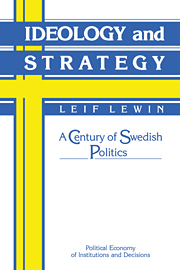Book contents
- Frontmatter
- Contents
- List of tables
- Series editors' preface
- Author's preface
- 1 The problem of rationality
- 2 Tariffs
- 3 Suffrage
- 4 Parliamentarism
- 5 The crisis agreement
- 6 Economic planning
- 7 The supplementary pension system
- 8 Nuclear power
- 9 Employee investment funds
- 10 Strategic action in politics
- Appendix
- Index
Author's preface
Published online by Cambridge University Press: 29 September 2009
- Frontmatter
- Contents
- List of tables
- Series editors' preface
- Author's preface
- 1 The problem of rationality
- 2 Tariffs
- 3 Suffrage
- 4 Parliamentarism
- 5 The crisis agreement
- 6 Economic planning
- 7 The supplementary pension system
- 8 Nuclear power
- 9 Employee investment funds
- 10 Strategic action in politics
- Appendix
- Index
Summary
In this work I have attempted to fulfill two purposes. The first was to write a basic textbook on Swedish politics during the past one hundred years. Rather than provide an exhaustive description, my account has focused on a handful of the most important controversies, beginning with the tariff dispute of the 1880s, that saw the birth of the modern party system. It examines the turn-of-the-century conflicts on suffrage reforms and the introduction of parliamentary government, then analyzes the crisis agreement of the interwar years – which laid the groundwork for the Swedish welfare state and its expansion of the public sector – and continues with studies of the postwar political battles on the economic planning issue and the compulsory supplementary pension system. The book closes with the present-day controversies on nuclear energy and government-run employee investment funds.
My second purpose was to present a theory of politics that has attracted increasing international interest – rational choice theory. Without denying the importance of other theories, it calls attention to the aims, calculations, and maneuvers of political actors; in game theory, it has found a concise format for summarizing its research findings. My own contribution has primarily been intended to show how rational choice theory can be applied empirically, because the disputes included in my book serve to illustrate various political strategies, games, and decision rules discussed by the theoreticians.
- Type
- Chapter
- Information
- Ideology and StrategyA Century of Swedish Politics, pp. xi - xiiPublisher: Cambridge University PressPrint publication year: 1989

